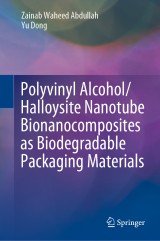Details

Polyvinyl Alcohol/Halloysite Nanotube Bionanocomposites as Biodegradable Packaging Materials
|
96,29 € |
|
| Verlag: | Springer |
| Format: | |
| Veröffentl.: | 10.10.2020 |
| ISBN/EAN: | 9789811573569 |
| Sprache: | englisch |
Dieses eBook enthält ein Wasserzeichen.
Beschreibungen
<p>This book focuses on the preparation and characterisation of polyvinyl alcohol (PVA)/ halloysite nanotube (HNT) bionanocomposite films with different HNT contents for potential use in food packaging. It examines the effect of material composition and nanofiller content on mechanical, thermal and optical properties in relation to their morphological structures, and also comprehensively describes the water resistance, biodegradation and migration rates of such bionanocomposites, as well as their barrier properties in terms of water vapour transmission, and water vapour, air and oxygen permeabilities. Further, this book discusses the use of Nielsen model and Cussler model to predict the relative permeability of bionanocomposites, demonstrating that Nielsen model is more effective and in better agreement with experimental data obtained. Lastly, it discusses the application of bionanocomposite films in food packaging to prolong the shelf life of freshly cut avocados and peaches.</p><p></p>
<div>Chapter 1: Introduction.- Chapter 2: Materials, Manufacturing Process and Characterisation Methods.- Chapter 3: Morphological, Mechanical and Thermal Properties of PVA/ HNT Bionanocomposite Films.- Chapter 4: Water Resistance and Biodegradation of PVA /HNT Bionanocomposite Films.- Chapter 5: Barrier Properties of PVA/ HNT Bionanocomposite Films.- Chapter 6: Component Migration of PVA/HNT Bionanocomposite Films.</div><div><br></div>
<div> <b>Zainab Waheed Abdullah</b> is currently a PhD student at the School of Civil and Mechanical Engineering at Curtin University, Australia. She was previously an assistant lecturer at the Department of Material Engineering, Technical Engineering College-Baghdad, Middle Technical University, Iraq. Her wide-ranging research interests include bionanocomposites, biopolymers and materials characterisation, particularly for low cycle fatigue.</div> <p> <b>Dr. Yu Dong</b> is a senior lecturer at the School of Civil and Mechanical Engineering, Curtin University, Australia. He has extensive research experience in the field of polymer nanocomposites, electrospun nanofibres, green composites, micromechanical modelling, nanomanufacturing and design of experiments. He is a lead book editor of "Manufacturing, Characterisation and Properties of Advanced Nanocomposites", MDPI, Switzerland, and "Fillers and Reinforcements for Advanced Nanocomposites", Elsevier, UK, and a solebook editor of "Nanostructures: Properties, Production Methods and Applications", NOVA Science Publishers, USA. He is also an associate editor of the journals “Frontiers in Materials” (Polymeric and Composite Materials section) and “Applied Nanoscience”.</p>
This book focuses on the preparation and characterisation of polyvinyl alcohol (PVA)/ halloysite nanotube (HNT) bionanocomposite films with different HNT contents for potential use in food packaging. It examines the effect of material composition and nanofiller content on mechanical, thermal and optical properties in relation to their morphological structures, and also comprehensively describes the water resistance, biodegradation and migration rates of such bionanocomposites, as well as their barrier properties in terms of water vapour transmission, and water vapour, air and oxygen permeabilities. Further, this book discusses the use of Nielsen model and Cussler model to predict the relative permeability of bionanocomposites, demonstrating that Nielsen model is more effective and in better agreement with experimental data obtained. Lastly, it discusses the application of bionanocomposite films in food packaging to prolong the shelf life of freshly cut avocados and peaches.<p></p>
Explores a novel bionanocomposite material system to combine biodegradable polymers and nanomaterials Provides a holistic approach of experimental characterisation and modelling in use of bionanocomposite films as environmentally sustainable materials Highlights a solution for reducing solid plastic waste by using novel bionanocomposite as a food packaging material
Diese Produkte könnten Sie auch interessieren:

Introduction to Focused Ion Beams

von: Lucille A. Giannuzzi, Lucille A. North Carolina State University

128,39 €















